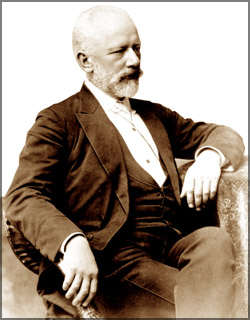|
Tchaikovsky:
Composer of beautiful music
You may have heard about the world-famous ballet 'Swan Lake' and some
of you may have even had the chance of seeing it, at least a local
production. Wasn't it a rather breathtaking experience?
 This brilliant piece of music on which the ballet is based on was
composed by Pyotr Ilyich Tchaikovsky, the Russian composer of the
Romantic era. Tchaikovsky was born in Votkinsk, a small town at the time
of Imperial Russia on May 7, 1840. His father, Ilya Petrovitch, was the
son of a government mining engineer. His mother, Alexandra, was a
Russian woman of partial French ancestry. This brilliant piece of music on which the ballet is based on was
composed by Pyotr Ilyich Tchaikovsky, the Russian composer of the
Romantic era. Tchaikovsky was born in Votkinsk, a small town at the time
of Imperial Russia on May 7, 1840. His father, Ilya Petrovitch, was the
son of a government mining engineer. His mother, Alexandra, was a
Russian woman of partial French ancestry.
Tchaikovsky began piano lessons at age five with a local woman.
Within three years, it was discovered that he could read music as well
as his teacher.
However, his parents' passion for his musical talent soon cooled and
in 1850 they sent him to a school for the "lesser nobility" or gentry
called the School of Jurisprudence in St. Petersburg to secure him a
career as a civil servant. For the little boy, the hardest thing was to
part from his mother.
Things took a turn for the worse on June 25, 1854 when his beloved
mother died. He reacted to her loss by turning to music; within a month
of her death, he was making his first serious efforts at composition, a
waltz in her memory..
While music was not considered a high priority at his institute,
Tchaikovsky was often taken to the theatre and the opera with
classmates.
He was fond of works by Rossini, Bellini, Verdi and Mozart. A piano
manufacturer, Franz Becker, made occasional visits to the school and
gave lessons. This was the only music instructions Tchaikovsky received
at school.
In 1855, Ilya Tchaikovsky funded private studies outside the
Institute for his son with Rudolph Kundinger, a well-known piano teacher
from Nuremberg. Ilya also questioned Kundinger about a musical career
for his son and was told that nothing suggested a potential composer or
even a fine performer.
Tchaikovsky graduated on May 25, 1859 with the rank of titular
counsellor, the lowest rung of the civil service ladder. On June 15, he
was appointed to the Ministry of Justice. Six months later he became a
junior assistant to his department; two months later, a senior
assistant.
There Tchaikovsky remained for the rest of his three-year civil
service career. In 1861, he attended classes in music theory taught by
Nikolai Zaremba through the Russian Musical Society.
The following year he followed Zaremba to the new St Petersburg
Conservatory. Tchaikovsky followed but did not give up his civil service
post until his father agreed to support him. From 1862 to 1865, he
studied music with Zaremba.
Anton Rubinstein, director and founder of the Conservatory, taught
him instrumentation and composition and was impressed by Tchaikovsky's
talent.
At the request of Rubinstein's younger brother Nikolai, Tchaikovsky
accepted the post of professor of harmony, composition, and the history
of music at the Moscow Conservatory. Around this time, he entered into a
working relationship with Balakirev. The result was Tchaikovsky's first
masterpiece, the fantasy-overture ‘Romeo and Juliet’.
Beginning with his ‘Fourth Symphony’, his music became an outlet for
him to voice frustrations and emotions previously kept bottled up. It is
also believed that the strain of his ill-fated marriage to one of his
former composition students, Antonina Miliukova may have actually
enhanced his creativity.
The ‘Fourth Symphony’ and the opera ‘Eugene Onegin’ could be
considered proof of this. He finished both these works in the six months
from his engagement to his "rest cure" in Switzerland following his
marriage. They are arguably two of his finest compositions.
He found a wealthy patroness around this time, Nadezhda von Meck, who
provided him with an annual subsidy of 6,000 rubles. This also allowed
him to resign from the Moscow Conservatory in 1878 and concentrate
primarily on composition.
During 1884, Tchaikovsky began to shed his unsociability and
restlessness. In 1885 Tsar Alexander III conferred upon Tchaikovsky the
Order of St. Vladimir (fourth class). With it came hereditary nobility.
The tsar's decoration was a seal of official approval that helped the
composer's social rehabilitation. That year he resettled in Russia. This
was the year that he debuted as a guest conductor too.
Within a year, he was in considerable demand throughout Europe and
Russia which helped him overcome a life-long stage fright and boosted
his self-assurance. Conducting brought him to America in 1891. He led
the New York Music Society's orchestra in his Marche Slave at the
inaugural concert of New York's Carnegie Hall.
Tchaikovsky stood out from many of his contemporaries in his great
fondness of melody and the quality of that melody - sweet and at times
bittersweet in tone. He was also extremely imaginative in orchestration.
Tchaikovsky's musical cosmopolitanism(asscociated with different
parts of the world) made him especially adept(skilful) in writing in an
Italo-Franco "Imperial style."
This style was favoured by Tsar Alexander III and the Russian upper
classes over the "Russian" harmonies of the time.
Tchaikovsky differed aesthetically from his contemporaries, with his
art as well as his artistic sensibilities leaning closer to Mozart and
Mendelssohn than to the music of contemporary Russians.
In 1893, the University of Cambridge awarded Tchaikovsky an honorary
Doctor of Music degree.
Tchaikovsky died on November 6, 1893, nine days after the premiere of
his ‘Sixth Symphony’, the Pathétique. His death has been attributed to
cholera, most probably contracted through drinking contaminated water
several days earlier. However, some believe his death was a suicide. |
